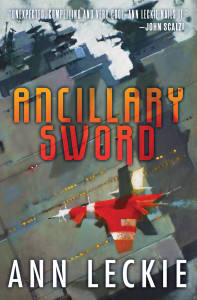
Ann Leckie can dance.
When her debut novel, Ancillary Justice, released in 2014, nobody expected it to hit the science fiction community like a nuclear bomb. But it did. And Leckie was dancing the whole way through.
It was a firecracker of a novel — small and intense — but the unusual narrative structure and Leckie’s bold take on gender might have limited the audience to the most passionate and feminist-minded readers. Instead, the exact opposite happened: Ancillary Justice wasn’t a small snap, crackle, pop in a corner of fandom, it was a conflagration of love and adoration heard ’round the community.
Ancillary Justice won almost every major literary award for science fiction and fantasy in 2014, including the Hugo and Nebula Awards for Best Novel, and has sold over 30,000 copies to date, proving that not only is there a market for progressive, thoughtful space opera, there’s a thirst for it among readers. Ancillary Justice was a huge critical and commercial success, but with that success comes a lot of pressure for a sequel that lives up to its predecessor and satisfies its many fans. Writing under that sort of pressure can be the first stumbling point for many first time novelists, but Leckie never misses a beat.
Ancillary Sword flies on different wings than Ancillary Justice.
Ancillary Sword flies on different wings than its predecessor. Ancillary Justice was a frantic roller coaster of a novel, leaving readers out of breath as they followed Breq on her quest for vengeance. Ancillary Sword features a more straight forward narrative. Gone is the complex split narrative, and in its place is a plot that trades structural complexity for approachability without sacrificing nuance.
In so many ways, Ancillary Sword is less a space opera and more a languid exploration of ideas that were passed by in Ancillary Justice‘s mad rush to its climax. Ancillary Sword features no big space battles, very little in the way of physical danger for the protagonists, and only the barest hint of a threat from the mysterious Presger (who would be smack bang in the middle of the conflict in most other space operas.) By avoiding the trap of trying to write the same novel over again, Leckie allows Ancillary Sword to nurture its own success, and to be as compelling and interesting as its predecessor without feeling stale.

At the centre of many of the novel’s most central themes are the ancillaries and Breq’s growing discomfort with her own history and the uneasy truce she has formed with the Lord of the Radch, Anaander Mianaai. Early in the novel, Breq ponders the twisted physical reality of the 3,000 year old emperor:
Each of her thousands of brains had grown and developed around the implants that joined her to herself. For three thousand years she had never at any time experienced being anyone but Anaander Mianaai. Never been a single-bodied person—preferably in late adolescence or early adulthood, but older would do in a pinch—taken captive, stored in a suspension pod for decades, maybe even centuries, until she was needed. Unceremoniously thawed out, implant shoved into her brain, severing connections, making new ones, destroying the identity she’d had all her life so far and replacing it with a ship’s AI.
If you haven’t been through it, I don’t think you can really imagine it. The terror and nausea, the horror, even after it’s done and the body knows it’s the ship, that the person it was before doesn’t exist anymore to care that she’s died.
p. 21
Breq is an ancillary who gains freedom by sacrificing her connections to the individual pieces that Leckie references above, an aspect that Leckie uses ably examine themes of individualism, societal obligation, and human rights. Breq directly confronts many of these issues through her narrative and some of the novel’s most introspective and philosophical moments. One such passage occurs when Breq considers the changes in her psyche as she continues to struggle with the loss of her ship and her ancillary bodies:
Anger was an old companion of mine by now. – Breq
When I had been a single ancillary, one human body among thousands, part of the ship Justice of Toren, I had never been alone. I had always been surrounded by myself, and the rest of myself had always known if any particular body needed something—rest, food, touch, reassurance. An ancillary body might feel momentarily overwhelmed, or irritable, or any emotion one might think of—it was only natural, bodies felt things. But it was so very small, when it was just one segment among the others, when, even in the grip of strong emotion or physical discomfort, that segment knew it was only one of many, knew the rest of itself was there to help.
p. 138

Art by John Harris
Breq desperately yearns the return of her ancillary network, is haunted by the limits of her single body, but struggles to reconcile her individual yearnings with her bitterness towards the threat that the hive-like ancillary technology poses to humanity. Breq’s anger, so explosive when it was focused in on her fight-or-flight quest for vengeance against Anaander Mianaai in Ancillary Justice, takes a back seat to her struggles to understand the nature of justice — a word central to Radch society, but also at the root of many of its problems — and finding peace in imperfect solutions.
As a result of the slower narrative, readers are treated to more of Leckie’s humor throughout the novel. This levity provides another layer of depth as Breq herself navigates the intricacies of human social behaviour.
“Fleet Captain is pretty fucking badass.” The vulgarity, combined with Seivarden’s archaic, elegant accent, set them laughing, relieved but still unsettled. p. 35
These sweet moments are balanced by biting social commentary and verbal swordplay that keeps the reader on their toes. Ancillary Sword is full of tense and interesting confrontations, but unlike the spaceborne battles in Ancillary Justice, these social conflicts are often more labyrinthine and delicate in nature. Breq is, in many ways, a savant at reading human emotion and nuance from an objective perspective, but lacks some of the subjective instincts inherent to non-ancillary humans. Watching Leckie slowly pick apart these barriers within Breq is fascinating.
This mad scramble helped me to recognize the biases that I was trying to apply to characters, the boxes my mind wanted to place them into.
There’s one moment when Breq is speaking to another character in a non-Radchaai language that uses gendered pronouns, and so sheds light on the gender of a character named Raughd that was opposite what I had posited in my visualization. This immediately sent my mind scrambling as it analyzed the relationships that Raughd had with other characters, and, in turn, what effect that had on my perception of their gender. This mad scramble helped me to recognize the biases that I was trying to apply to characters, the boxes my mind wanted to place them into, and recognizing this provided me with an added layer of perspective unique to Leckie’s narrative. It allowed me to parse the characters by characteristics other than their gender and to accept their relationships at face value.
Where Ancillary Sword really succeeds, perhaps better than its predecessor, is in those relationships that are developed throughout the novel. Between its breakneck pace and the orientation required to understand the complexities of Leckie’s narrative style/pronoun usage, it was often difficult to find time to breathe while reading Ancillary Justice; whereas Ancillary Sword gives the reader welcome opportunity to sidle up alongside Breq and her companions and adversaries.
Tisarwat, a young leuitenant aboard Breq’s ship, Mercy of Kalr, is full of secrets, and it’s difficult not to fall in love with her earnestness and heart. Seivarden, one of the highlights of Ancillary Justice, is sadly sidelined, but is replaced by the equally brooding Sirix. Kalr Five, whose enthusiasm for antique dishware is amusing and ultimately relevant to the plot, also endears herself to the reader in her limited screentime. Ancillary Sword breathes life and personality into a setting that could at times be very sterile and difficult to empathize with in Ancillary Justice. While the emotions never run quite so high as they did while experiencing Breq’s final hours with Lieutenant Awn, the various characters in Ancillary Sword are motivated by believable desires and remain interesting even when Breq is only watching them from afar.
Ancillary Sword is one of the year’s finest novels.
Building on the impressive groundwork laid by Ancillary Justice, Ancillary Sword might be a surprising departure from its predecessor, but it’s clear than Leckie understands the delicacy necessary to handle the follow-up to one of the most beloved novels of the past decade.
Ancillary Sword is one of the year’s finest novels and a terrific follow-up to Ancillary Justice. Breq’s story of vengeance and redemption takes several turns that add to an already conflicted and labyrinthine narrative, proving that Leckie’s no one trick pony. The Imperial Radch trilogy continues to be one of the most impressive science fiction narratives of recent years.

I’m already sold on this. Excellent review, Aidan :)
I just got a copy of this to listen to. CANNOT WAIT.
Severely tempted to reread or relisten to Ancillary Justice again. But maybe after the new book :)
[…] Review: Ancillary Sword by Ann Leckie, read by A Dribble of Ink […]
[…] Review: Ancillary Sword by Ann Leckie, read by A Dribble of Ink […]
Where does one get Ancillary Sword since the ongoing Amazon/Hachette battle prevents one from obtaining it in “the usual fashion”?
I am glad to see that people seem to generally think that the sequel is as good as (if not better!) than the first book. I’m curious where you got your sales figures from? Is 30k a decent number for non-genre fiction? How do these sales figures compare with the sales of the James S.A. Corey books or the latest George R.R. Martin book? What’s the impact of the HBO adaptation on the sales of the earlier books in A Song of Ice and Fire?
Just some thoughts for a future blog post.
I completely missed that we could deduced Raughd’s gender!
Also, when you say “Leckie herself has stated that she “actually know the genders of most of the characters in the all-Radchaai scenes,””, I think you’ve missed out a “doesn’t”.
I was quite surprised to notice that I was coping perfectly well with not knowing people’s genders, especially because I’m quite a visual reader and like to know what everything and everyone looks like. Pure genius!